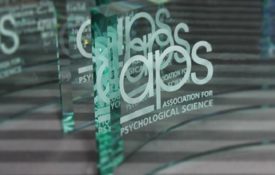-
Grin and Bear It: A Smile or Grimace May Reduce Needle Injection Pain, UC Irvine Researcher Shows
UC Irvine has good news for the 50 million Americans who are afraid of needles. In a recently published paper, UC Irvine researchers found that simply smiling or grimacing can significantly reduce pain from needle injections. The researchers also found that a smile can reduce the stress of a needle injection and lower an individual’s heart rate. ...
-
What Can the Pandemic Teach Us About Human Nature?
It all happened so quickly. In a matter of weeks, our world was upended when a far-flung outbreak spiraled into a genuine pandemic. With vaccines and pharmaceutical interventions still a speck on the horizon, human behavior has become a key factor in battling the disease. The crisis has also pummeled both individuals and society itself with a plethora of mental health burdens, from stress and anxiety to social isolation. Research on COVID-19’s psychological impact is still evolving.
-
How to Deal With Job Loss Without Damage to Your Self-Esteem
Our careers fulfill a number of different functions in our lives, says David Blustein, a professor of counseling psychology at Boston College and author of “The Importance of Work in an Age of Uncertainty: The Eroding Work Experience in America.” Work helps us satisfy our needs to achieve, earn an income, connect with others and feel like the authors of our own stories, he says. In Western cultures in particular, Dr. Blustein says, our jobs are often so integrated into our identities that it is common to feel as though we have lost some sense of self if we lose them. This can take a toll on your mental health.
-
Do You Miss Hugs?
Not everyone is a hugger. Hugs can feel awkward or uncomfortable for some people. At the same time, hugging can be essential for humans. Hugs can reduce stress by calming our sympathetic nervous system; they can make us feel safe, loved and not alone. ... Research has shown that hugs can lower our cortisol levels during stressful situations, and can raise oxytocin levels and maybe even lower our blood pressure. A 2015 paper published in Psychological Science even found that study subjects who got more hugs were less likely to get sick when exposed to a cold virus than those who weren’t hugged as often. ...
-

New Research in Psychological Science
A sample of research on how people think that others are more likely to be “bad” than themselves, intuitive physical reasoning, effects of COVID-19 on relationship satisfaction, recreational fear, alcohol experiences, visuospatial attention, and age advantages in emotional experience during COVID-19.
-

Eleven Psychological Scientists Receive APS’s 2021 Lifetime Achievement Awards: Association’s Highest Honors Recognize Outstanding Contributions to Science
APS is pleased to announce its lifetime achievement award recipients for 2021.

